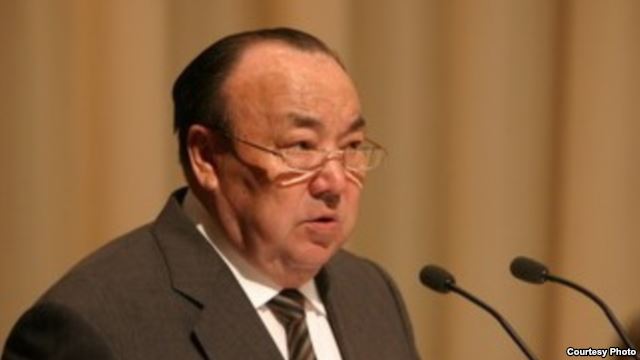
Forging of Alliance Between Tatar and Bashkir Nationalists Worries Moscow
Publication: Eurasia Daily Monitor Volume: 10 Issue: 97
By:

Tatar and Bashkir civil organizations are moving toward the forging of an alliance, regional and Russian experts say. “Bashkir nationalists have tried to find support among Tatar and Ugro-Finnish nationalists for several years, but their attempts were unsuccessful,” Bashkir analyst Ed Murzin told the Regnum news agency. “Ugro-Finnish peoples along with all other ‘non-titular’ [i.e. non-Bashkir] ethnic groups in Bashkiria were discriminated against by the ethnic nationalist regime of Murtaza Rakhimov” (https://www.regnum.ru/news/fd-volga/tatarstan/1659405.html#ixzz2TftOXTLZ). As of 2010, ethnic Bashkirs comprised only 30 percent of the republic’s population, while ethnic Tatars made up more than 25 percent and ethnic Russians slightly over 36 percent (Russian state statistical service, www.gks.ru). So the ethnic make-up of Bashkortostan naturally drives ethnic Bashkirs and Tatars to form some kind of union as pressure on the republic from Moscow increases.
The previous long-time president of Bashkortostan, Murtaza Rakhimov, stepped down in July 2010, under heavy pressure from Moscow. Earlier, in 2009, Rakhimov was stripped of his control over an oil company, Bashneft, and oil refineries when the giant Russian investment holding firm JSFC Sistema bought up most of the assets owned by Rakhimov’s family. It is noteworthy that Moscow replaced the veteran and heavyweight politicians of the two neighboring republics of Bashkortostan and Tatarstan almost simultaneously. In March 2010, then–Tatarstani President Mintimer Shaimiev’s term expired and he was not reappointed.
Moscow was reasonably successful in phasing out Shaimiev and Rakhimov as the strongest and longest lasting regional leaders in the non-Russian republics in Russia. The leaders of Tatarstan and Bashkortostan used to play an important role in Russian national politics. For example, Shaimiev and Rakhimov were co-founders of the United Russia party through the political party bloc Otechestvo—Vsya Rossiya (Fatherland – All Russia), which later fused with United Russia. Both republics have enjoyed a windfall of oil profits since both have well-developed energy sectors as well as an extensive range of other industries. This material backing made Bashkortostan’s and Tatarstan’s claims to sovereignty quite substantial, so both republics, especially, Tatarstan, had a “special relationship” with Moscow. As Vladimir Putin concentrated power in his hands, the influence of Shaimiev and Rakhimov, along with that of other regional governors, waned. But, as an unexpected consequence of Moscow’s victory over the Tatar and Bashkir strongmen, local activists now came to the forefront as the champions of the national cause in their respective republics. While previously the leaders of Bashkortostan and Tatarstan could successfully claim to represent the Bashkir and the Tatar people, respectively, this became more problematic after Moscow started appointing regional governors and Russian companies moved in to take over lucrative businesses in both republics.
In the summer of 2012, Tatar activists from the Azatlyk organization visited Ufa, the capital city of Bashkortostan, at the invitation of the Bashkir organization Kuk Bure, after which the two groups carried out several joint activities. Azatlyk activists also held talks with civil activists in two other neighboring republics—Chuvashia and Udmurtia, located to the west and to the north of Tatarstan, respectively. Azatlyk further proclaimed the aim of creating a Union of Turkic Youth (https://azatliq.info/ru/news/adverts/183-?????-?-????????????-???????-??-2012-???).
Some Russian experts allege that the nationalists’ goals of creating European-style independent states in Tatarstan and Bashkortostan are no longer relevant. Instead, pan-Turkism and pan-Islamism are dominant in the Tatar and Bashkir movements, the experts assert (https://www.regnum.ru/news/fd-volga/tatarstan/1659405.html#ixzz2TftOXTLZ). The reality is, however, that there are few opportunities for political activists in either Tatarstan or Bashkortostan to pursue separatist ideas without being persecuted by the Russian authorities. So it is only natural that politically active forces move on to find the greatest possible support among all minorities and state their goals in a relatively benign-sounding way in order to avoid criminal persecution. When civil protest is progressively curbed by the authorities, it is not hard to predict that Islam will gradually become the protesters’ ideology.
In March, Tatarstan’s mufti Ildus Faizov stepped down. Faizov had been wounded in a bomb explosion in July 2012, and he probably never fully recovered. In April, 28-year-old Kamil Samigullin was elected as Tatarstan’s mufti. Samigullin received his Islamic degrees from the North Caucasian Islamic University in Makhachkala, a madrasa in Istanbul and the Russian Islamic University in Kazan. The Council of Muftis of Russia harshly criticized the authorities for imposing Samigullin’s candidacy on the Muslim community of Tatarstan (https://www.newsru.com/religy/17apr2013/samigullin.html). On the other hand, the Russian conservative commentator on Islam, Roman Silantyev, praised the authorities’ choice, saying that Samigullin belongs to the so-called Kadimist Islamic school in Tatarstan that has been traditionally quite loyal to the Russian government (https://www.ng.ru/ng_religii/2013-05-15/4_muftii.html). Meanwhile, on May 15, a court in Kazan ordered the Muslim group al-Ikhlas in the capital of Tatarstan to disband, accusing it of “extremism.” Members of the group were present in the court and vowed to appeal to a higher court to overturn the decision (https://www.ng.ru/news/431684.html).
It is, of course, a huge exaggeration to say that all of Russia’s minorities are unifying against Moscow, but regional proto-alliances are possible, as seems to be the case with Tatarstan, Bashkortostan and other neighboring republics. As the Russian authorities progressively remove any traces of independence from the regional governors, protest activity among the increasingly disenfranchised ethnic minorities appears to be transferring to civil organizations. In addition, with the evident resurgence of Russian nationalism, regional nationalisms are bound to follow the lead, so that even governors explicitly loyal to Moscow will start extending tacit support to nationalist entrepreneurs.




